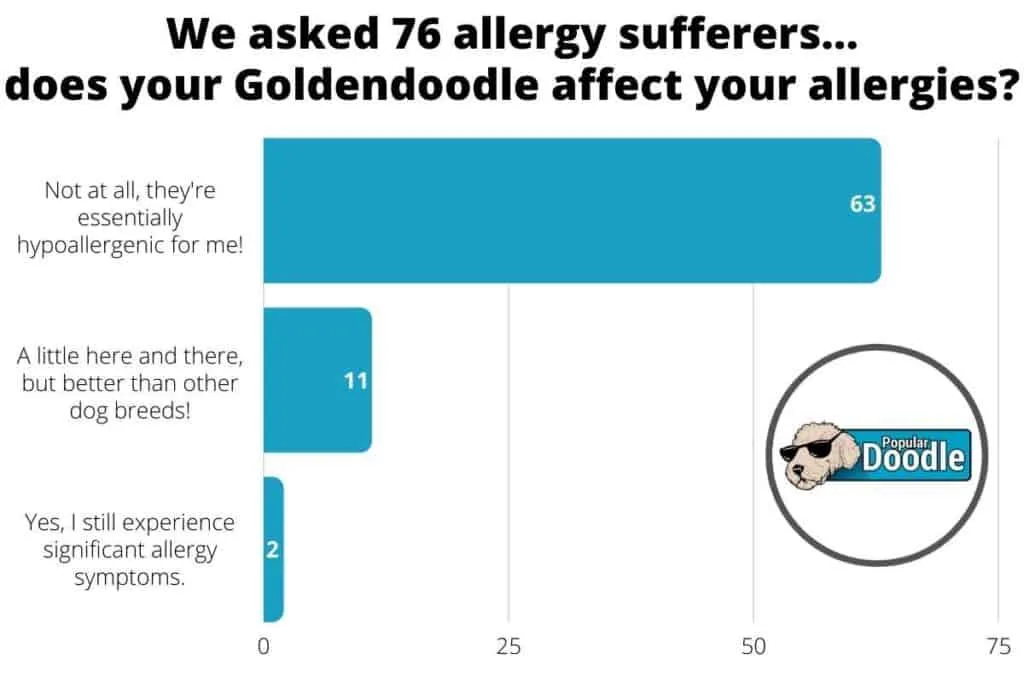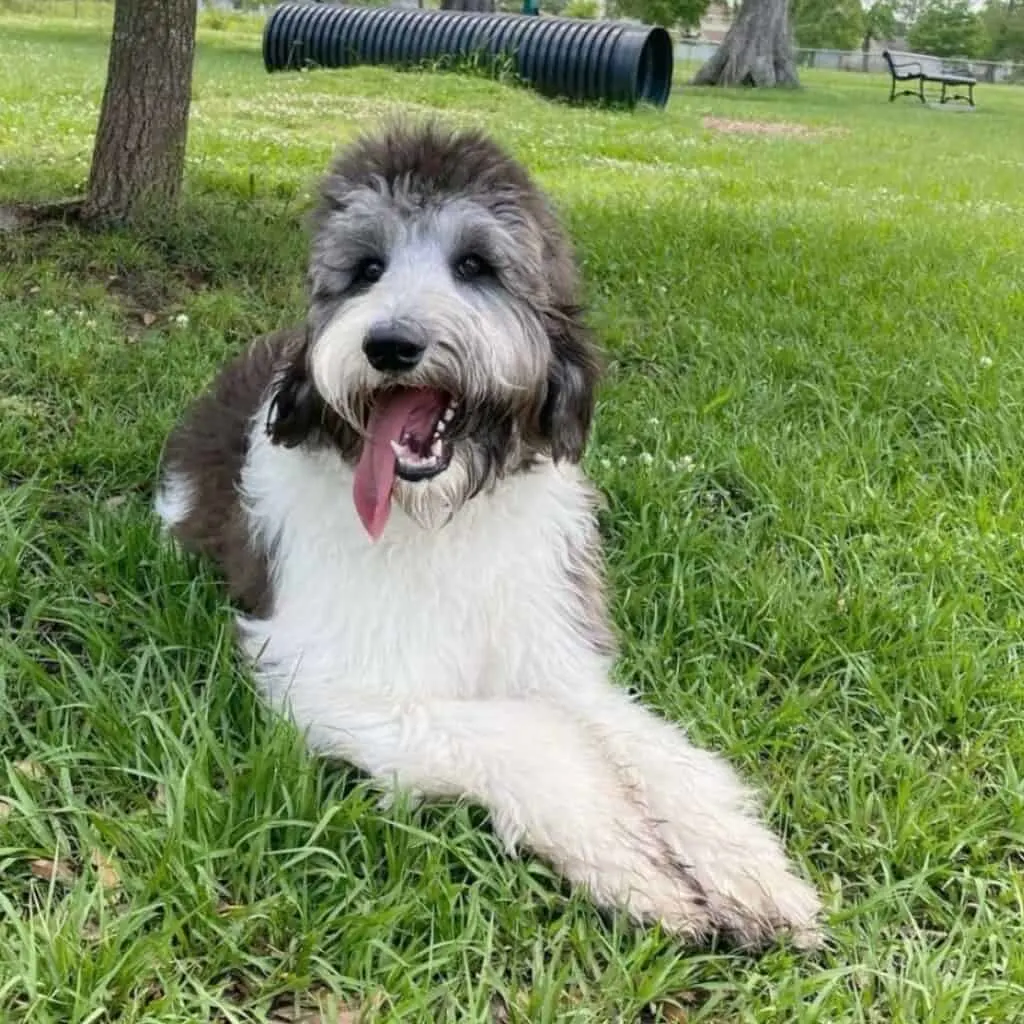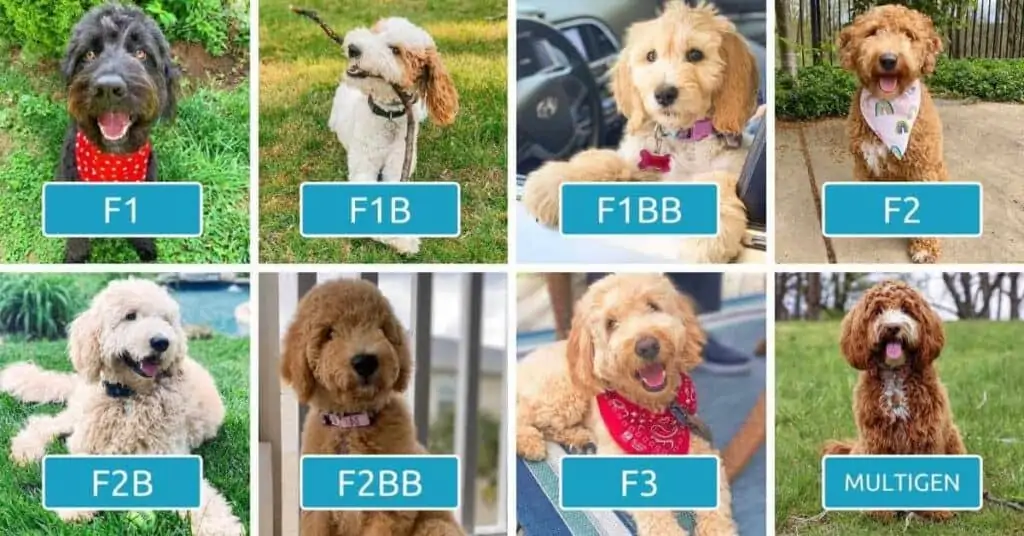
Goldendoodles are one of the most popular mixed breeds in the world! This high demand could easily be chalked up to their cuteness or wonderful personality. However, the main reason behind this popularity is that people associate Goldendoodles with being allergy-friendly or even hypoallergenic!
This claim has been subject to a lot of debate, however. Since they’re a cross between one hypoallergenic breed and one non-hypoallergenic breed, are all Goldendoodle puppies really hypoallergenic?
Goldendoodles are NOT guaranteed to be hypoallergenic. However, many Goldendoodles are allergy-friendly and this breed is typically a good choice for those with mild to moderate allergies. In a survey of 76 Goldendoodle owners with dog allergies, 83% of people said they don’t experience any symptoms due to their pet.
Here are the complete survey results…

Survey Comments from Goldendoodle Owners
“I am quite allergic and I have a Poodle and a Goldendoodle. Both are hypoallergenic for me.”
“Nope. And I have allergies to most animals.”
“My son breaks out with swollen eyes and redness around lots of other dogs. He’s had no issues with our two [F1B Goldendoodles].
I have many allergies….dogs, cats, outdoor stuff, etc. My allergies have gotten worse. Not specifically due to [my Goldendoodles], but due to their love of grass and everything else. I’m outside more because of them, and they roll in EVERYTHING and then bring it in on their fur.
I’m getting allergy-tested next month, and then will likely start shots again. When I was a child, I was allergic to 63 of the 70 items they tested and was on allergy shots for around 15 years. It’s been about 10-12 years since then, and the allergist said that’s about the time frame that you begin to have issues again.
So, overall, JUST per the dog dander and saliva…my son and I have no issues. Over the winter, I didn’t react to our [Goldendoodle] at all, and after a bath before I let them back out, I’m fine. BUT, if you have other environmental allergies, be aware of that part!” -Jenny S.
“Dog is my 3rd highest allergy behind cats and dust. I have zero issues with our [F1BB Goldendoodle]. She sleeps in our bed sometimes and I do all her grooming myself. Zero issues.”
“I have a [Goldendoodle] and a Poodle and we are good!”

Survey Takeaways
From this data, we can clearly see two things…
- Most Goldendoodles do not trigger their owner’s allergies.
- Despite being the minority, there are still a significant portion of Goldendoodles that DO trigger their owner’s allergies.
Now that we know Goldendoodles aren’t guaranteed to be hypoallergenic, how can we put the odds in your favor?
If you know what to look for, you can “predict” with a decent amount of accuracy whether a Goldendoodle will be hypoallergenic or not. There are also a few simple ways Goldendoodle owners can minimize any allergic reactions they may have to their dog.
Keep reading as we’ll learn about all this and more!
Can You Be Allergic to Goldendoodles?
Based on our survey results, about 16% of Goldendoodle owners with dog allergies experience at least mild allergic reactions to their pet.
Allergic reactions vary from person to person as well as from dog to dog. It’s not uncommon for people to be allergic to one Goldendoodle but not another. It’s also not uncommon for one person to be allergic to a particular Goldendoodle while another person doesn’t experience any symptoms.
While allergies are a very individualized topic, the best indicator we have of whether a breed is allergy-friendly is the collective experiences of other owners.
Are Goldendoodles Good for Allergies?
When we surveyed 76 Goldendoodle owners with allergies, 83% experienced no symptoms to their dog, 14% experienced lessened symptoms, and 1% experienced significant symptoms.
The conclusion we can draw from this data is that Goldendoodles are typically a safe choice for those who only experience mild allergies to dogs. I don’t know about you, but a 97% chance of experiencing lessened or no reactions sounds like pretty good odds!
On the other hand, those with more severe dog allergies may be better off choosing a completely hypoallergenic breed. Even the relatively small, 15% chance that you won’t be able to tolerate your new Goldendoodle puppy is a huge risk to take.
Goldendoodles are a mix of two breeds where only one is hypoallergenic. I’d recommend those with severe allergies only consider a hypoallergenic purebred breed or a mixed breed comprised of only hypoallergenic parent breeds.
Examples of Hypoallergenic Purebred Breeds:
- Poodle
- Maltese
- Portuguese Water Dog
- Schnauzer
- Bichon Frise
Examples of Hypoallergenic Poodle Mix Breeds:
- Whoodle
- Schnoodle
- Maltipoo
- Poochon
What Causes Goldendoodle Allergies?
While most people think that dog allergies are caused by fur, they’re actually caused by dander. These little flakes of dead skin are exacerbated and spread around as your dog sheds.
As a result, low-shedding breeds, such as the Goldendoodle, tend to be more tolerable to those with allergies.
While dander is the most common type of dog allergy, it isn’t the only one! People can be allergic to dog saliva or urine as well!
If this is the case, a dog being “hypoallergenic” doesn’t make a difference, as this term only refers to dander allergies that are triggered by shedding.
Additionally, pets can bring in common allergens from the outdoors like grass, pollen, etc. So while you might not be allergic to your Goldendoodle, they could be unintentionally making your other allergies worse!

What Type of Goldendoodle is Best for Allergies?
The generation of your Goldendoodle is the single biggest factor that influences whether or not they’ll be hypoallergenic.
For those not familiar with the concept of generations, don’t worry! Put simply, a Goldendoodle’s generation describes how close they are in DNA to a purebred Golden Retriever vs. a purebred Poodle.
This can be a confusing topic to understand so, if you haven’t already, I’d recommend checking out our complete guide to Goldendoodle generations!
Here’s what you need to know about generation when it comes to whether Goldendoodles are hypoallergenic or not…
Generations that are closer to the Poodle in DNA are more likely to be allergy-friendly or hypoallergenic. Generations that are closer to the Golden Retriever in DNA are more likely to trigger symptoms in allergy sufferers, particularly if they have a flat coat.
Best Goldendoodles for Allergy Sufferers:
- F1BB Goldendoodle (87.5% Poodle, 12.5% Golden Retriever)
- F2BB Goldendoodle (81.25% Poodle, 18.75% Golden Retriever)
- F1B Goldendoodle (75% Poodle, 25% Golden Retriever)
- F2B Goldendoodle (62.5% Poodle, 37.5% Golden Retriever)
Worst Goldendoodles for Allergy Suffers:
- Reverse F1B Goldendoodle (25% Poodle, 75% Golden Retriever)
- F2 Goldendoodle (50% Poodle, 50% Golden Retriever)
- F1 Goldendoodle (50% Poodle, 50% Golden Retriever)
Here is a handy table that explains Goldendoodle generations in more detail…

Keep in mind that the estimated DNA splits above are only theoretical percentages and nothing is guaranteed. This means an F1BB Goldendoodle can experience shedding and trigger allergies while an F2 Goldendoodle can be hypoallergenic for almost everyone!
It’s rare, but it happens! Genetics can truly be a grab bag.
Signs You May Be Allergic to Your Goldendoodle
Sometimes you may not even realize you have dog allergies before taking your new puppy home from a breeder or Goldendoodle rescue.
Here are some of the most common symptoms those with allergies to Goldendoodles experience…
- Congestion
- Sneezing
- Runny nose
- Itchy, red, or watery eyes
- Facial pressure or pain
- Itchy skin
- Hives
While the most common symptoms tend to be mild, more severe reactions have been reported including difficulty breathing. Talk to your doctor as soon as possible if you think you’re experiencing allergies to your Goldendoodle.

How to Minimize Goldendoodle Allergies
It can be incredibly disheartening to learn that you’re allergic to your Goldendoodle. Rehoming your new, fluffy best friend isn’t an option for most of us, but does that really mean you have to suffer for your Goldendoodle’s entire life?
Related: Goldendoodle Lifespan: How Long Do Goldendoodles Live?
Luckily, this doesn’t have to be the case!
Medication is one option which you may want to consult your doctor about. Additionally, by making a few simple changes, many dog owners have reported far fewer allergy symptoms.
Brush & Bathe Your Goldendoodle Often
In our battle against dander, we need to start directly at the source—your Goldendoodle!
By bathing and brushing your Goldendoodle regularly, you’ll help to remove loose hair and dander in a controlled environment. This will reduce the amount of hair and dander that gets spread all over your house!
You’ll want to brush your Goldendoodle at least every other day, but daily is even better! Bathing should happen regularly, but not nearly as often as brushing.
About once a month is a good bathing routine for Goldendoodles. Bathing more frequently than that can cause your Goldendoodle to have itchy skin and actually make shedding worse!
Here are a few grooming products that Goldendoodle owners have suggested can reduce shedding as well…
- Chris Christensen Big G Slicker Brush – This brush is a godsend! Not does it work wonders on tangles and matting, but it’ll get all that loose hair out like no other brush I’ve used before.
- FURminator De-Shedding Tool – Not necessary for most Goldendoodles, but ones that shed a significant amount will benefit from this tool.
- Burt’s Bees Shed Control Shampoo – This is my favorite brand of shampoo designed to control shedding as it’s all natural!
Invest in a Quality Vacuum & Use it Regularly
For best results, I recommend vacuuming weekly. However, your current vacuum cleaner may not be effective when it comes to pet hair and dander.
Investing in a vacuum that was designed specifically for owners of shedding dogs can be a game changer!
This highly-rated vacuum does the best job at removing pet hair while using a HEPA filter to reduce allergens in the air.
Keep Your Goldendoodle Off the Furniture & Out of the Bedroom
As much as your pup may want to snuggle with you in bed or on the couch, you may want to keep these areas “dog-free zones” if you have allergies.
Related: Do Goldendoodles Like to Cuddle?
Couches and beds can act as safe havens for dander since they’re hard to keep clean. Additionally, by keep these zones free of dander, you allow your body a break from the constant exposure to allergens.
Related: 6 Things Dog Owners Should Be Cleaning Regularly (But Few Actually Do!)
If you feel bad keeping your Goldendoodle on the floor, get them a cozy pet bed! They’ll love having a place of their own and a nice soft surface to relax.
Use a HEPA Air Purifier
Allergens from dander aren’t just around your house—they’re floating in the air too! An air purifier with a HEPA filter helps eliminate allergens in the air therefore significantly reducing your symptoms.
I recommend having one in your bedroom as well as one in the room where you and your Goldendoodle spend the majority of your time together.
Is a Goldendoodle Puppy Right for Your Family?
You now know that Goldendoodles tend to be allergy-friendly, but aren’t guaranteed to be hypoallergenic. With that in mind, you can now make a more informed decision on whether this breed is right for you.
There are pros and cons to every decision, and whether you should get a Goldendoodle is no exception!
Start by comparing it to other breeds like the Cavapoo, Aussiedoodle, Newfypoo, and Bernedoodle.
After that, if you’ve decided a Goldendoodle is right for you, you should decide whether you want a mini or standard size.
Who knows? Maybe you’ll even find that two dogs are better than one!







![What is a Sable Goldendoodle? [Photo Gallery & FAQs] what-is-a-sable-goldendoodle](https://populardoodle.com/wp-content/uploads/2021/11/what-is-a-sable-goldendoodle-1024x536.jpg.webp)


